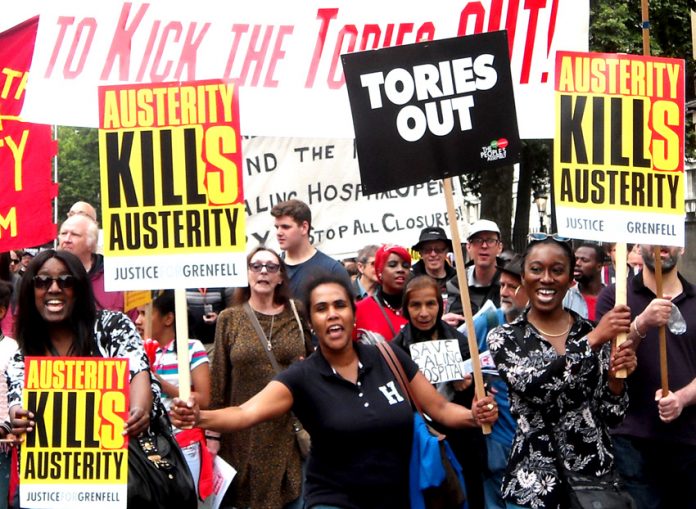CLADDING on 181 tower blocks in 51 areas of the country have now failed fire safety tests.
Meanwhile it also emerged yesterday that there are no sprinklers in 300 Scottish tower blocks.
Right across the UK there are hundreds of potential disasters waiting to happen.
Reports confirm that the Grenfell Tower inferno, which claimed the lives of over 80 men, women and children, was completely avoidable if fire-proof cladding and sprinklers had been fitted.
Cladding from as many as 600 tower blocks across England is being tested as it is thought Grenfell Tower’s recently-installed cladding may have helped the fire to spread.
All of the material checked so far in the wake of the tragedy on 14 June has failed the tests.
A new investigation has now found that thousands of homes in more than 300 tower blocks across Scotland do not have potentially life-saving sprinkler systems.
This is despite the fact that every high-rise built in Scotland since 2005 must have sprinklers, by law.
After the Lakanal House fire in Camberwell in 2009, which tragically claimed the lives of six people, a special report was done by the all-Party Parliamentary Group on Fire Safety and Rescue.
This report, which was sat on for four years, recommended that sprinklers be fitted in every tower block – these recommendations were ignored.
According to Assistant Chief Officer David McGown, of the Scottish Fire and Rescue Service (SFRS) sprinkler systems can be a ‘cost effective and potentially lifesaving intervention in the early stages of a fire.’
Indeed, this was exactly what the report by the all-Party Parliamentary Group on Fire Safety and Rescue found.
The report found that sprinkler systems were 99% effective at controlling or extinguishing fires when they operate.
Meanwhile, Grenfell Tower survivors have threatened to boycott the inquiry unless the judge, who has been chosen to lead it, is removed.
Justice 4 Grenfell campaign group says ‘systemic issues’ need to be looked at, rather than just the fire itself.
Yvette Williams, one of the organisers of the Justice 4 Grenfell campaign group, said survivors and victims’ families were ‘very, very angry’ and wanted the ‘systemic issues’ related to the fire to be looked at as part of the inquiry.
‘They cannot just look at 14 June, when that building became an inferno. They can’t do that.
‘If we don’t get good terms of reference for the public inquiry and we don’t get a wide remit so that those people can take responsibility for what they’ve done, then we won’t participate in it.’
